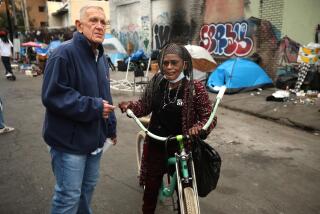Spared by judge, battered Duroville gives the only thing it has: thanks
- Share via
THERMAL — In the tightly packed streets of Duroville, where poverty and despair are longtime residents, people awoke Friday to a rare sense of hope and possibility.
The Ochoa sisters traipsed down a sun-blasted dirt road wearing wide grins and speaking in near messianic terms about a far-off federal judge who saved their homes Thursday.
“We have been asking Jesus to send us an angel and this judge reached out and helped when we had no other recourse,” said Catalina Ochoa, 43. “We really don’t have anything to give, but we ask Jesus to bless this judge.”
Her sister Eudalia chimed in. “I want to invite him to our next great fiesta,” she said.
The outpouring of gratitude toward U.S. District Judge Stephen Larson echoed throughout this great decrepit maze of a trailer park, home to almost 5,000 poor farmworkers.
On Thursday, the judge slapped down the U.S. government’s seven-year effort to close Duroville, vowing to keep it open for at least two more years but urging tenants to find safer housing elsewhere. He also ordered that repairs at the park continue.
Closing the park, he said, would have caused a “major humanitarian crisis.”
The decision swiftly ended months of fear among residents, who had expected eviction at any moment. Lives had been put on hold. Some tenants had stopped paying rent, preferring to stockpile cash for when they were ordered out.
Hundreds of residents gathered at the gates Thursday night, awaiting word of their fate and imagining the worst. The rumors had all been bad.
“They wanted to hear it in person,” said Tom Flynn, the park’s court-appointed receiver. “When we told them, you could feel the excitement. People were hugging each other and thanking God for the judge, and thanking the United States. It just brought tears to your eyes.”
Ugly and battered, Duroville seems an unlikely place over which to shed tears, but to residents it’s far more than a ramshackle desert trailer park.
It’s a 40-acre universe of neighborhoods, shops, traditional healers and extended families. Almost everyone works in the fields and few earn more than $10,000 a year.
Despite often extreme living conditions -- some trailers house more than a dozen people -- few want to leave.
“I feel so good now that I get to stay,” said Maria Mulato, 24, a mother of five living in a one-bedroom trailer with no furniture and a single lightbulb. She held her 8-month-old son, Brian, while two other children lay on blankets on the floor. Her husband earns $400 a month picking grapes and citrus.
“I have lived in this park for 11 years,” she said through an interpreter. “This is my home. I have no other place to go.”
Mulato and the Ochoa sisters are Purepechas, an indigenous people from Michoacan, Mexico. There are more than 2,000 Purepechas in Duroville. They hold their own festivals and speak their own language.
They also have an extensive support network. When work is scarce, as it is now, they pool their resources and share food and money. “They feel united here,” said Pablo Elias, a Purepecha. “This has become their village.”
A few streets over, the Cisneros clan flowed out of their trailer and down the doorsteps. The children played while the women made tortillas in the steamy kitchen. The mood was light, almost giddy.
Adriana Martinez, 18, cradled her sleeping 8-day-old daughter Marlan, who wore a pink headband.
“We had been very worried for months that we would have to leave while I was pregnant,” she said. “We kept saying, ‘Where are we going to live? There are no other places to go.’ When I found we could stay I was so happy.”
So was Jessica Cisneros, 9, who feared leaving her school. “I love the school,” she said, leaning against the trailer, which is home to 10 people. “I like every subject but I like reading best of all.”
The patriarch of the Cisneros family, a man Flynn calls ‘a force for good’ in the park, is 54-year-old Augustine Cisneros.
He has 15 children, 25 grandchildren and one great-grandchild, and has been in Duroville for 10 years.
Most of his family lives in the park. Leaving would probably mean breaking up that family, something he can’t imagine doing.
Cisneros and his wife, Consuelo, attended the Duroville trial despite being unable to understand English.
“We were very impressed with the judge just by looking at him,” Cisneros said.
“We were very scared for the last year, but we are at peace now. We finally feel safe.”
--
More to Read
Sign up for Essential California
The most important California stories and recommendations in your inbox every morning.
You may occasionally receive promotional content from the Los Angeles Times.













